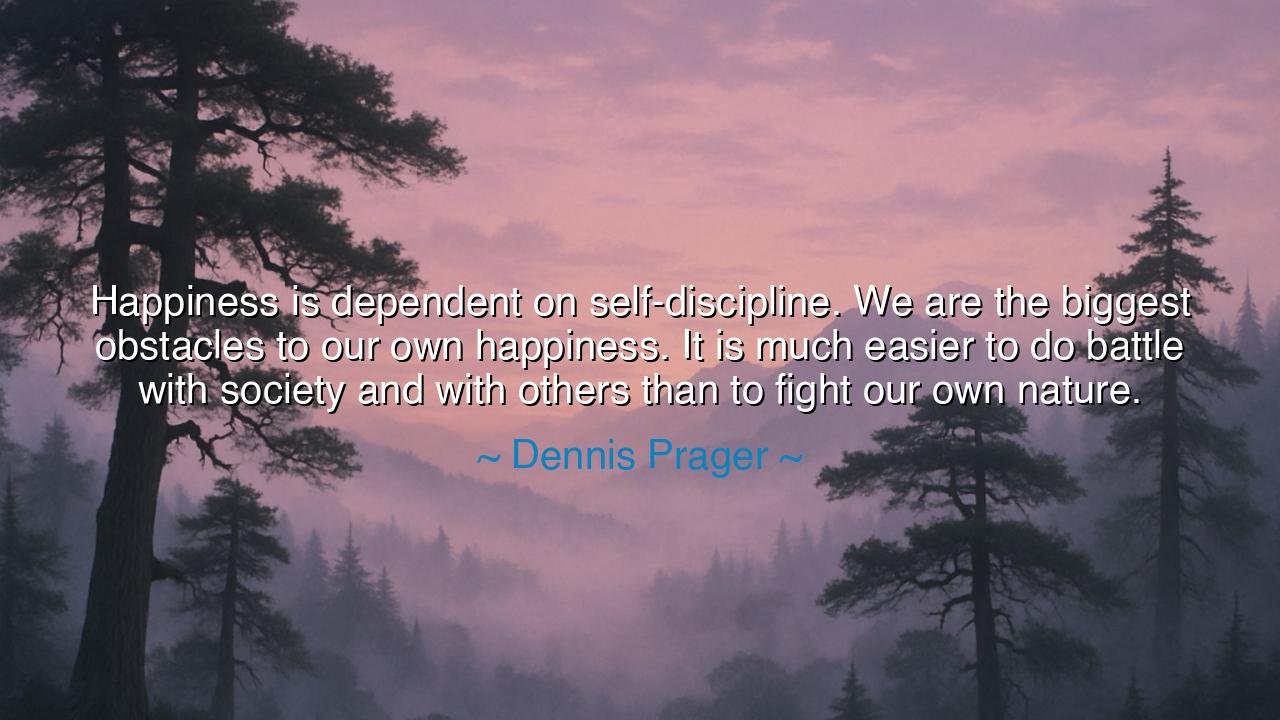
Happiness is dependent on self-discipline. We are the biggest
Happiness is dependent on self-discipline. We are the biggest obstacles to our own happiness. It is much easier to do battle with society and with others than to fight our own nature.






The philosopher Dennis Prager spoke with the gravity of one who understood the hidden battles of the human soul when he said: “Happiness is dependent on self-discipline. We are the biggest obstacles to our own happiness. It is much easier to do battle with society and with others than to fight our own nature.” These words strike like thunder upon the spirit, for they unveil a truth that mortals have long sought to avoid—that our greatest enemy is not the world around us, but the ungoverned heart within. The discipline of the self is the foundation upon which all lasting happiness is built. Without it, joy is fleeting, and peace forever beyond reach.
From the dawn of civilization, sages and prophets have echoed this same wisdom. The ancients taught that man must first conquer himself before he dares to command anything else. For the world outside may be tamed by strength, by cunning, or by law—but the world within, filled with passions, fears, and desires, yields only to self-discipline. It is easier, as Prager says, to wage war upon nations than upon one’s own impulses. Yet the victory over self is the greatest of all victories, for it is eternal and unassailable.
Consider the words of Marcus Aurelius, emperor of Rome and student of the Stoics, who ruled the mightiest empire of his age yet wrote in his private meditations: “You have power over your mind—not outside events. Realize this, and you will find strength.” Though surrounded by armies and courtiers, Marcus understood that the fiercest battles were fought not on battlefields, but in the silence of one’s thoughts. The man who cannot rule his temper, his pride, his appetite, or his sloth, is a slave—even if he wears a crown.
The story of Siddhartha Gautama, who became the Buddha, stands as a shining testament to this truth. Born into luxury, he possessed every comfort known to man, yet felt an emptiness no pleasure could fill. Abandoning his palace, he sought truth through discipline—fasting, meditating, enduring hardship. It was only when he mastered his own nature, when he broke the chains of desire and fear, that enlightenment came upon him. His journey was not against kings or armies, but against himself. Thus did he conquer the world by conquering the self.
But few in our age wish to hear such counsel. We battle governments, we argue with friends, we protest against the failings of others, all the while neglecting the unruly kingdom within. We seek happiness through comfort, through distraction, through the approval of crowds. Yet happiness, as Prager declares, does not blossom in indulgence—it blooms in restraint. It is not found in surrender to one’s impulses, but in the quiet mastery of them. The man who learns to rise early, to speak kindly when angered, to persevere when weary—this man becomes his own liberator.
To practice self-discipline is not to live joylessly, but to live with purpose. It is to train the mind as a warrior trains the sword—to cut through chaos and illusion. The ancients compared the soul to a chariot: reason the driver, passion the horses. When discipline holds the reins, the chariot races toward destiny. When discipline falters, the horses run wild, and the soul is dragged into ruin. Thus, the path to joy is not through yielding to one’s nature, but through refining it.
The lesson, then, is clear: if you seek happiness, seek first to master yourself. Guard your habits, for they shape your destiny. Speak truth even when falsehood tempts you. Choose effort over ease, virtue over comfort, and patience over rage. Each act of self-control is a stone laid upon the road to peace. Though the struggle is hard, each victory within makes the world itself a gentler place.
So remember, my children of the future: the true warrior does not wield a sword but wields self-discipline. He fights not for conquest but for harmony within his soul. Do not blame the world for your unrest; look instead within. For when the heart is ordered, the world itself grows brighter. And when you have mastered yourself, you shall discover that happiness is not a reward from without, but a light that has been burning within you all along.






AAdministratorAdministrator
Welcome, honored guests. Please leave a comment, we will respond soon